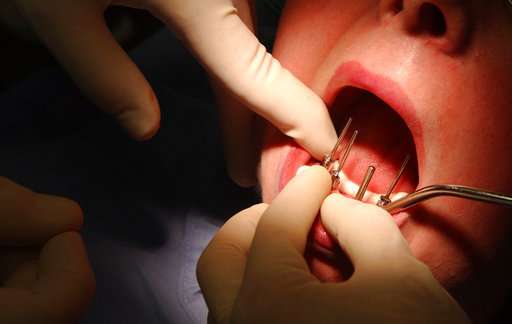Medical credit cards can mean aches and pains for patients

Few people look forward to a trip to the doctor or dentist, especially if they're not sure how they will pay for it.
Some choose to use a special kind of credit card offered by medical professionals to pay for care at certain locations or networks. Often pitched by office assistants, they can seem like a quick fix for pricey procedures not covered by insurance including dental work, cosmetic surgery or laser vision correction.
Nearly a third of Americans report trouble paying their medical bills and many have taken on credit card debt to pay the expenses, according to a recent survey by the Kaiser Family Foundation.
But consumer advocates warn medical credit cards can saddle patients with unexpected penalties and sky-high interest rates.
CREDIT CONFUSION
One of the biggest dangers is that patients often don't understand the financial terms or even that they are signing up for a credit card, according to lawyers who have represented customers.
"There is a lot of misunderstanding. Patients think they are just setting up an installment plan with the dentist," said Gina Calabrese, co-director of St. John's University School of Law's Public Interest Center in New York. "They don't understand they have opened a new line of credit and all the risks involved with that."
Most cards feature a "zero interest" promotional period of up to 18 months. But then the interest rate can jump to 25 percent or higher. Those details can be glossed over or skipped entirely when patients sign up.
In cases cited by U.S. authorities, some consumers never received a copy of the credit card terms and had to rely on spoken explanations from staffers who had little training on the card details.
SURPRISE INTEREST
Another potential pitfall is something called deferred interest. That means if consumers don't pay off the entire procedure during the "interest-free" period, they can be retroactively charged for interest dating back to when they first signed up.
For example, a patient might pay off $900 of a $1,000 procedure during a card's promotional period. But because the amount wasn't fully paid off they now owe interest on the entire bill, often at a double-digit interest rate.
"The way these companies make money is on the consumers who don't pay off the entire balance during the promotional period," said Chi Chi Wu, an attorney with the National Consumer Law Center.
Additionally, paying the card's minimum monthly fee usually won't pay off the expense before the retroactive interest kicks in.
For patients who decide to take on medical credit, advocates say it's essential to pay off the entire borrowed amount within the promotional period.
TRUST ISSUES
The rate hikes on medical credit cards are not unique. Credit cards issued by department stores and other retailers often have similar terms. But advocates say consumers tend to be less wary of products offered by medical professionals.
"One expects a higher level of care from a health professional than, say, a car salesman," said Calabrese. "People don't think your dentist is going to encourage you to enter into a financial agreement that is oppressive or unfair."
The cards are good for medical businesses because doctors can charge patients for procedures they might not otherwise be able to afford. And the medical provider is promptly paid by the card issuer.
STEP BACK
Before signing up for a medical credit card, experts suggest researching other options. In some cases, medically necessary procedures might be available for a discounted rate or even for free at a hospital, many of which provide some level of charitable care.
If the procedure is not urgent, consider waiting until a later date and paying cash. If you must use a credit card, consider using a regular one instead—with terms and conditions you understand.
© 2018 The Associated Press. All rights reserved.

















